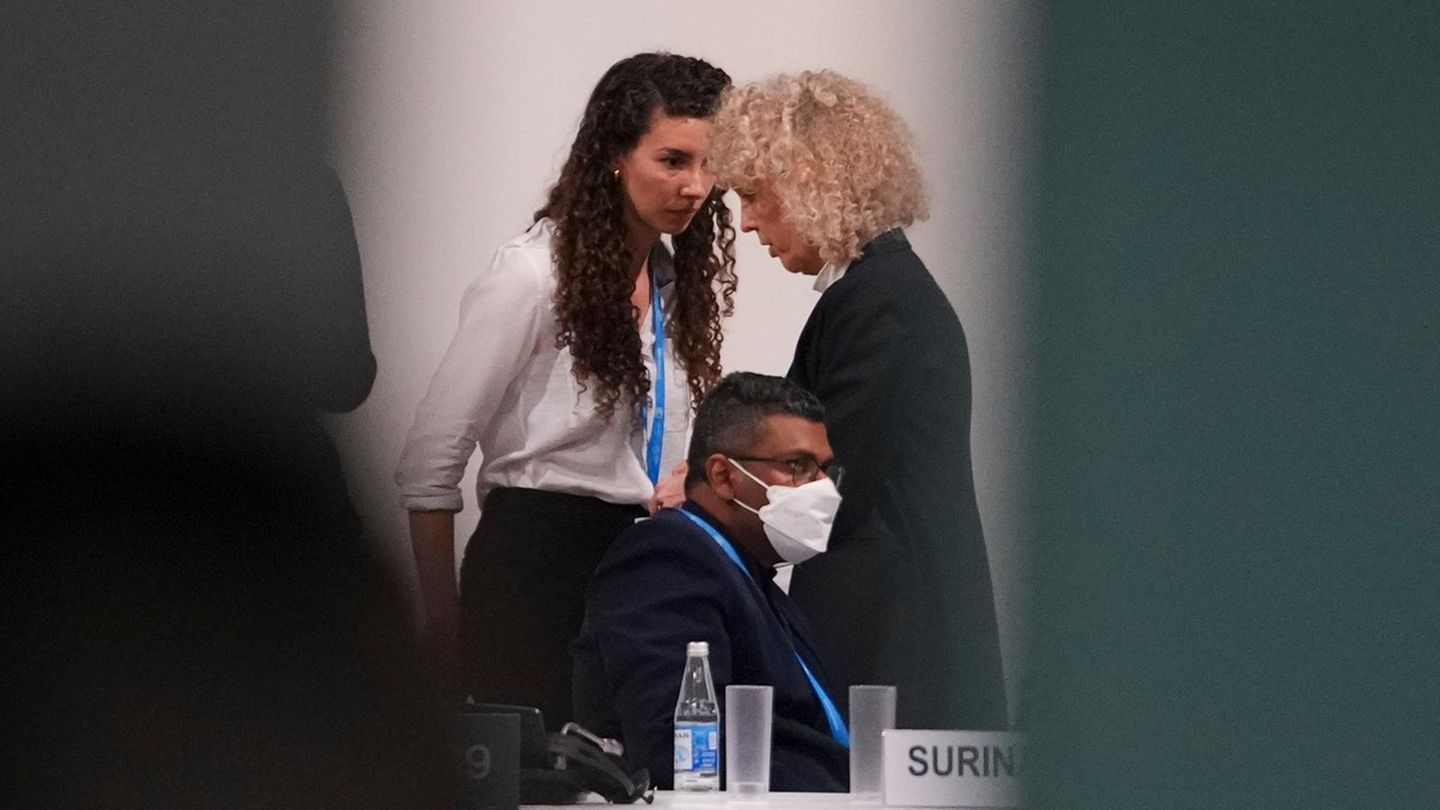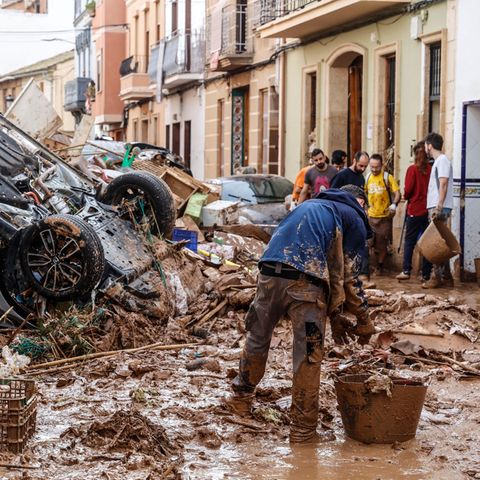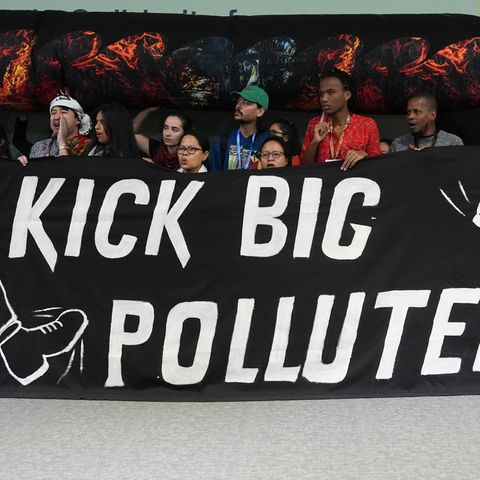Uproar at COP29
Climate summit in Azerbaijan is in danger of failing
Copy the current link
As expected, the climate summit in Baku is being extended. But the COP participants are deeply divided. Poor countries feel disadvantaged, others are stonewalling when it comes to climate protection.
The climate conference in Baku is on the brink. After around 24 hours of extension, the host Azerbaijan’s chaotic conduct of the negotiations, which was widely criticized, became clearly visible: entire groups of countries left the negotiating room, uncoordinated draft texts found their way into the public and Foreign Minister Annalena Baerbock attacked the presidency in an unusually harsh manner.
In the decisive final phase, representatives of the island states and the least developed countries left the negotiating room in protest against the presidency because, according to them, it ignored their concerns in circulating draft texts. Agreement? “Rejected!” shouted a negotiator.
With their action, those involved protested against existing draft resolutions in which they do not see their interests taken into account. “We were not heard,” said negotiator Cedric Schuster on behalf of the Alliance of Small Island States (Aosis), explaining this unusual step. “Better no agreement than a bad agreement,” the spokesman for the African group, Ali Mohamed, had previously threatened that the conference would fail.
Poor countries feel disadvantaged in financial matters
The background is the struggle for a new framework for international financing of climate protection and adaptation to climate impacts. Dozens of developing countries had vehemently demanded trillions in funding. An independent UN group of experts also comes to the conclusion that the need for external aid will be around 1,000 billion US dollars per year by 2030 – and even 1,300 billion by 2035.
It became clear from negotiating circles that instead of the $250 billion that was initially proposed as annual climate aid from industrialized countries to poorer countries, there is now $300 billion on the table. Although there is no new draft resolution yet, various draft texts are circulating, against which there is great resistance from some countries.
Developing countries as a whole consider the sums offered to be insufficient. The protest was obviously also about the distribution of funds. The poorest and most vulnerable states are demanding that a certain share of this be reserved for them.
A spokesman for the island nations asked: “How can you expect us to return to the women, men and children in our countries with a deal that is sure to plunge them into further danger?” What is happening here makes it clear that industrialized and developing countries are in different boats. “After the end of this COP29, we cannot simply sail into the sunset. We are literally sinking.” However, EU delegation circles said that it was assumed that the negotiations would continue.
Baerbock: “Money alone won’t save the world”
Federal Foreign Minister Annalena Baerbock (Greens) once again acknowledged the “historic” responsibility of industrialized countries for climate change, including from a financial perspective. At the same time, with a view to China and other countries, she reiterated that “the large and rich new emitters” of greenhouse gases must also be included in climate financing. In draft resolutions it was said that other states should be “encouraged to make contributions”, but “on a voluntary basis”.
At the same time, the Foreign Minister warned against taking steps backwards on climate protection decisions made last year. Climate aid and the reduction of climate-damaging emissions “are very closely related,” said Baerbock – because “Money alone won’t save the world,” she added in English.
Emissions targets at COP29 also controversial
The EU delegations are doing everything in the negotiations “to build bridges,” said EU chief negotiator Wopke Hoekstra on Saturday in Azerbaijan. However, it is uncertain whether this will be successful. Federal Foreign Minister Annalena Baerbock (Greens) spoke of a “power play” by states with fossil interests, including the Azerbaijani presidency.
Another sticking point is the move away from fossil fuels, which the international community agreed on last year. The EU states are insisting on a clear commitment to reducing greenhouse gas emissions in accordance with the resolutions at the UN conference in Dubai. Baerbock made it clear that the EU “will not accept” a departure from this.
“Here at the climate conference in Baku we are in the middle of a geopolitical power game,” said Baerbock. Unfortunately, this is being carried out by “fossil states” “on the backs of the poorest and most vulnerable countries”. “We Europeans will not allow the most vulnerable states in the world, especially the small island states, to be ripped off by some of the new fossil fuel and rich emitters here,” the minister added – “and in case of doubt, with the backing of the COP Presidency”.
According to observers, Saudi Arabia in particular tried, together with some large authoritarian states, to reverse decisions on climate protection that had already been made during the two-week negotiations. There were sometimes strong accusations from various quarters in Baku against the presidency’s conduct of the negotiations. This would not take existing compromise proposals into account and exclude groups of states from consultations, it was said.
What happens if COP29 fails?
Because of the slow negotiations, the World Climate Conference has been extended. It was actually supposed to end on Friday evening.
Time is running out for an agreement: at least two thirds of the approximately 200 contracting states must be there to make a decision. This is particularly a problem for poorer countries because their delegates often do not have the money to rebook flights and hotels.
If no agreement is reached, the financial aid of 100 billion US dollars per year that has been decided so far will expire in 2025. What happens after that would be postponed until negotiations next year. In concrete terms, this means that many countries do not have enough money to effectively implement climate protection and they cannot adapt sufficiently. In the end: more suffering, more destruction and more migration to richer regions of the world like Europe.
Note: This post has been updated.
DPA · AFP
cl
Source: Stern
I have been working in the news industry for over 6 years, first as a reporter and now as an editor. I have covered politics extensively, and my work has appeared in major newspapers and online news outlets around the world. In addition to my writing, I also contribute regularly to 24 Hours World.






